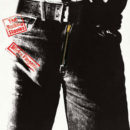Joanna Newsom Divers
Fuck, a perfect record.
Let’s make one thing clear before moving further: Perfect is not Good. Voltaire claims those two are enemies; perfection is not a moral quality, but rather a state of lacking fault in design and execution. Good is an intangible quality attached by the self; a perfect record isn’t necessarily a good record. But I’m digressing.
If you are unfamiliar with Joanna Newsom, well, first go take care of that by listening to Ys, her second and most acclaimed album, produced by Steve Albini, then come back. If you are not willing to do that, take my word that Newsom is a truly sui generis artist, whose mixture of baroque pop, art rock, and progressive rock is utterly incomparable.
Her voice has the quality of sunlight refracted on the thin ice of a lake in the middle of nowhere: delicate and ready to crack in an instant. The music has the same fragile elegance to it, as her preferred instrument is the harp. Her lyrics travel on transcendent journeys and introduce bizarre characters, all while the music veers in a million directions at once. Which brings me to Divers, which is my favorite record of Newsom’s catalog.
While her previous work has been immensely enjoyable in a far-off way, I have consistently taken issue with the indulgence of her style. Her music has never been, well, restrained. It is a kaleidoscopic carnival of sounds, but there is such a thing as too much of a good thing, and her two best records, Ys and the enormous, two-hour Have One on Me, both suffer from this issue. Divers, fortunately, does not. With her newfound sense of restraint, her songwriting has improved immensely and as such Newsom has created a “perfect” record. By pulling back she has allowed herself to explore musical ideas more fully, and the results are immense.
Her voice has the quality of sunlight refracted on the thin ice of a lake in the middle of nowhere: delicate and ready to crack in an instant.
But what makes this a perfect album? Well, that’s hard to qualify due to opinions being, you know, subjective. For me, perfect music is intricate, dynamic, honest, nuanced, well-produced, flows, and has an overwhelming sense of balance. Divers has all of this, and the sum is greater than its parts.
The first thing one notices on this collection is that each song has a paradoxical sense of self-containment, while also contributing to the record’s holistic landscape and concept. You can listen to each of these songs in isolation and enjoy them as much as you could within the album’s context. For example, take the opening track “Anecdotes” and the track “Sapokanikan.” These songs are self-contained, have a beginning, middle and end and have specific movements and musical ideas. However, if you listen to them in sequence, the musical ideas that end “Anecdotes” have a sense of continuity and interdependence with the opening musical ideas of “Sapokanikan,” so there is a sense of musical movement. Each track, while maintaining individuality, contributes to the whole: no track is unnecessary.
If there is one minor misstep, it is the dissonance between the magisterial, eponymous “Divers” and “Same Old Man.” The former track is a deep analysis of what it means to love, stripped down to a harp and Newsom’s vocals, whereas “Same Old Man” is a relatively lighthearted, if morbid and gentle, exploration of age. The contrast works for me though, and as such I can forgive the misstep.
Accounting for the above, there is also a unifying thematic concern that ties all these tracks together: time and love. Each track explores these two huge ideas: the notion of growing older, storytelling as a measurement of time, and an honest, if pained, assessment of what it means to be in a devoted, long-term relationship. There are lyrical leitmotifs that appear on each of the tracks that create a unity of effect that lends itself to a sense of climax. When we reach the final track, “Time As a Symptom,” and Newsom mournfully sings, “I was wrong/Love is not a symptom of time/Time is a symptom of love,” it is an earned moment. This conclusion is foreshadowed in the movements of the music and the composition’s dynamics. Everything flows into this moment; it is eternally back and forth and it leaves behind an immense sense of satisfaction.
If I have problems with this LP, they are almost exclusively limited to its stylistic specificity. If you don’t like art pop with a variegated sense of instrumentation or Newsom’s vocals–which are utterly hers–then you won’t like this record. If you are someone for whom a driving beat is a necessity, this can be a tough sell. If you are someone who doesn’t actively listen to music, it may not be evident what’s so great.
At this point in my life–thinking about love, relationships, patience, and my Beatrice–this all speaks to me powerfully. As a writer who obsesses over Joyce and composes palaces of paragraphs, intricate, balanced, and beautiful; as an audiophile who analyzes love to a fault, who loves musical tapestries and constantly seeks perfect albums, Divers is a powerful experience. It is not my favorite record this year, but it is a perfect record.
And for me, that’s good.
Until Love is a Symptom of Time.
10000 out of 10000 Rawckus Kung Fu Throwing Stars












